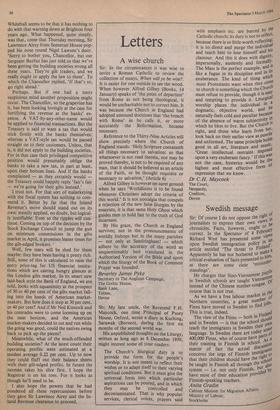Sir: My late uncle, the Reverend F.H. Maycock, one time
Principal of Pusey House, Oxford, wrote a diary in Kuching, Sarawak (Borneo), during the first six months of the second world war.
His unpublished thoughts on the Liturgy, written as long ago as 6 December 1939, might interest some of your readers: The Church's liturgical duty is to provide the form for the people's worship. It is not meant to reflect their wishes or to adapt itself to their varying spiritual conditions. But it must give the universal form into which particular aspirations can be poured, and in which they may be controlled and decontaminated. That is why popular services, clerical voices, prayers said
with emphasis etc. are barred by the Catholic church; its duty is not to reflect, because there is so little worth reflecting; it is to direct and purge the individual and teach him to lose himself and his clamour. And this it does with dignity, impersonally, austerely and formallY. The Mass is the perfect example, and is like a fugue in its discipline and in its exuberance. The kind of thing which most Protestants want when they conic to church is something which the Church must refuse to provide, though it is easY and tempting to provide it. Liturgical worship places the individual in a dogmatic, objective world, and he naturally feels cold and peculiar because of the absence of warm subjectivity in which he likes to live. But the Church is right, and those who learn from her, look back on their earlier view as Puerile and unformed. The same principle holds good in all art, literature and music. 'Great intellectual restraint imPosed upon a very exuberant fancy.' If this was not the case, hysterics would be the highest and most effective form of expression that we know.
Dr C.H. Maycock
The Court, Neopardy, Crediton, Devon










































 Previous page
Previous page